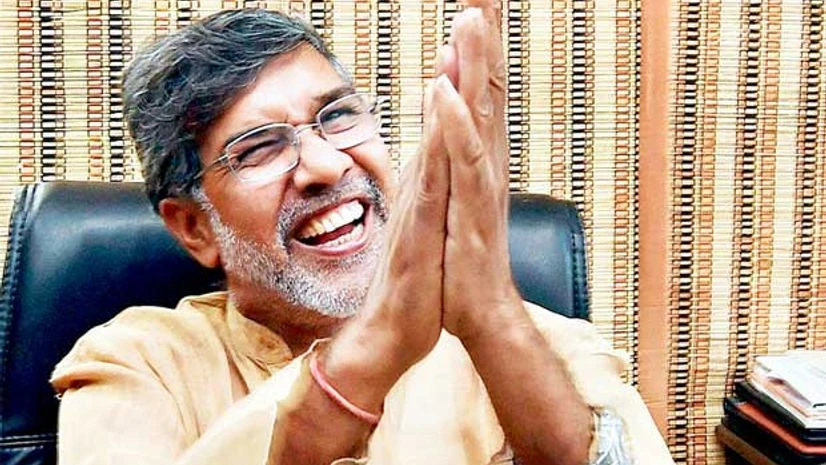On Kailash Satyarthi's first day at school, he spotted a child his age at work as a cobbler on the doorstep of his classroom. This incident stayed with him, Satyarthi said in interviews years later, and pushed him to devote his life to fighting child labour.
On Friday, Satyarthi, 60, shared the Nobel Peace Prize with teenage Pakistani education campaigner Malala Yousafzai, for their "struggle against the suppression of children and young people and for the right of all children to education."
"I am thankful to the Nobel committee for recognising the plight of millions of children who are suffering in this modern age. It is a huge honour for me," Satyarthi said in comments reported by PTI. "It is more than that. The fight has to continue. We are happy that the issue has been recognised globally now. I will continue my work."
More From This Section
Over 30 years of activism, Satyarthi has won numerous awards, including the Medal of the Italian Senate in 2007, the Robert F Kennedy Human Rights Award in 1995, and the Aachener International Peace Award in 1994.
"Kailash deserved this award for his pioneering work in locating the issue of child labour in the context of human rights," said Shanta Sinha, former chairperson of National Commission for the Protection of Child Rights, who won the Magsaysay award for her work on child rights. (CHILDHOOD LOST IN WORK)
In a 2011 opinion piece for the Mint, Satyarthi located child labour in a broader paradigm of corruption. "Children are employed not just because of parental poverty, illiteracy, ignorance, failure of development and education programmes," he wrote, "but quite essentially due to the fact that employers benefit immensely from child labour as children come across as the cheapest option, sometimes working even for free...The presence of a large number of child labourers in the country indicates unabated corruption and black money."
"Satyarthi began his work raiding carpet factories in east Uttar Pradesh," recalled Meenakshi Ganguly, South Asia director for Human Rights Watch. In the 1990s, Ganguly accompanied BBA volunteers on one such raid. "I was shocked by the dark, poorly ventilated huts in which children were forced to work."
Satyarthi's work, she said, was critical in its emphasis on the gap between the drafting and the implementation of child protection laws.
Over the years, BBA claims to have rescued 78,500 children from exploitative work conditions and to have played a pivotal role in the Global March Against Child Labour, a worldwide coalition of civil society groups and trade unions.
The Global March drew in a variety of former child workers, including Basu Rai, author of 'From the Streets of Kathmandu', who described Satyarthi as a father figure. "I used to share my stories with him," Rai said in an interview with The Times of India in 2014, "He gently nudged me to publish my book."
Satyarthi was also part of the Nagrik Ekta Manch that has fought for justice for the victims of the Sikh riots of 1984. "Kailashji was part of the Nagrik Ekta Manch that we formed to help victims of the anti-Sikh riots of 1984," said lawyer and activist H S Phoolka. "We rescued several Sikhs and also visited relief camps. He is still active, regularly attends our meetings and supports our struggle."
Yet, some have been troubled by BBA's television-ready tactics of conducting factory raids in large teams of activists, policemen and the media. "Child protection has moved beyond this paradigm," said an activist, "BBA has filed numerous cases in court which they haven't followed up. Instead, they tend to focus on publicity-friendly campaigns."
In the mid-1990s, Satyarthi famously fell out with politician and social crusader Swami Agnivesh, with both sides claiming the other had capitalised on their fame and sold out. Of late, Agnivesh said they had resolved their differences. "It is a cause of great joy that Kailash has won this award," Agnivesh said.
Satyarthi's award, child activists hope, will result in a more thoughtful approach to child rights. "We hope this shall be a big boost for child rights and child protection in India," said Amod Kanth, of child rights group Prayas, adding, "For example, this government has pushed through amendments to the Juvenile Justice Act (JJA) without any discussion with anyone, including Sathyarthiji."
Kanth, who has worked with Satyarthi for over 20 years, said child rights activists, including Satyarthi, were fiercely opposed to a recent amendment to the JJA, wherein minors charged with serious offences could be tried as adults. "Barely 3,000 children commit serious offences each year," he said. "For that, the government is willing to change the law without any consultation," Kanth added.
Kanth said he went straight to Satyarthi's house when he heard the news. "I ran up to him and we both cried together."
FRIEND OF CHILDREN: JOURNEY OF THE MAN WITH A MISSION
Kailash Satyarthi
-
Born: January 11, 1954, Vidisha, Madhya Pradesh
-
Member of a high-level group formed by UNESCO, Education for All, comprising select presidents, prime ministers and UN agency heads
-
Indian government yet to confer any civilian award on him so far
- Gordon Brown, former UK PM, visited him during his state visit in 2009

)
